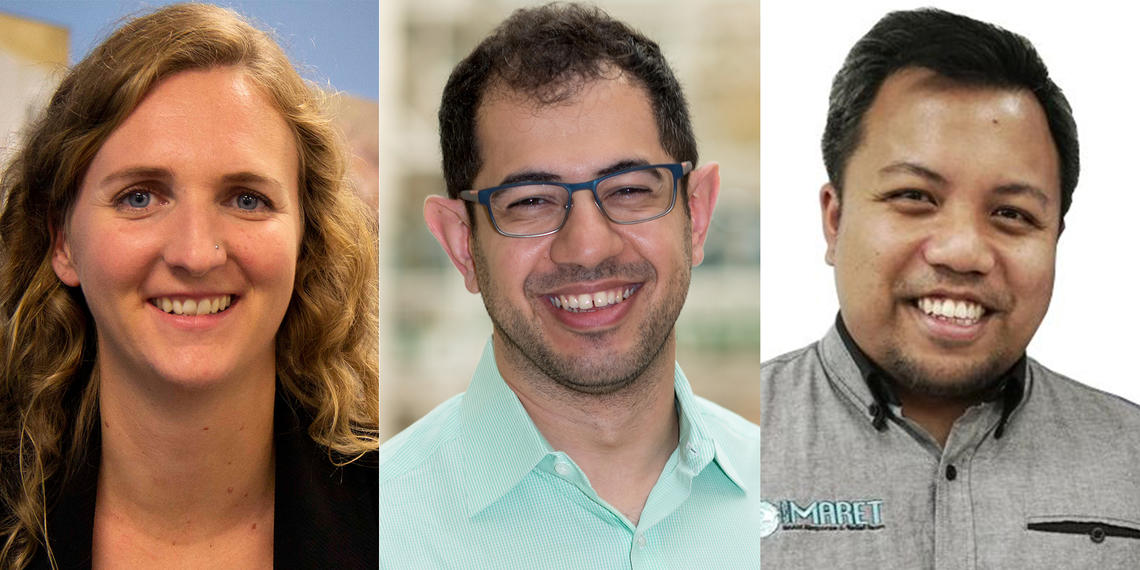Sept. 24, 2020
Alumni Month weighs in on a global water crisis

If you could use a glass of water right now, quenching your thirst is as simple as walking to the kitchen sink and turning on the tap, or retrieving a bottle from the refrigerator. But for more than one-third of the world’s population, that water comes at a much higher price — an end reward that comes only after walking for endless hours, possibly even through dangerous circumstances.
Approximately 2.5 billion people do not have access to clean, safe water, and some of the underlying issues and possible solutions related to this will be the topic at a Sept. 29 Alumni Month event called Dig In! Global Challenges to Clean Water Access.
Hosted on Zoom by Leanne Madjidi, BSc’06, from the Centre for Affordable Water and Sanitation Technology, the panel will feature two of this year’s Arch Awards recipients: Dr. Abdullah Saleh, MD, BSc’05, and Dr. Ahmad Munawwar Helmi bin Salim, MD’10.
- Photo above: Soon after Ahmad Munawwar Helmi bin Salim returned home to Malaysia after completing his degree in medicine, he spearheaded a massive flood-relief mission off the east coast of that country where thousands of homes had been destroyed.

From left: Leanne Madjidi, Abdullah Saleh, and Ahmad Munawwar Helmi bin Salim.
Both practising medical doctors, Saleh and Salim are extensively involved in international clean-water initiatives for marginalized communities. Here are five things they’ve learned about access to clean water that might surprise you:
- Water is perceived to be the new oil and will be the subject of the next “gold rush.” The frenzied demand for clean drinking water has already led to the establishment of water cartels. “You wouldn’t believe the violence that happens around safe water — it happens all over the world, but especially in slums,” says Saleh, whose non-profit, Innovative Canadians for Change, has supplied more than 100,000 Kenyans with access to clean drinking water.
“Gangs will take control of the neighbourhood tap and sell water to people at 25 cents for 20 litres, which is a lot if your income is less than a dollar a day. At a higher level, cartels are also being built by corporations fighting to take control over water reservoirs.”
- Access to clean water is considered the No. 1 public health intervention, even ahead of vaccinations, says Salim, whose social enterprise, BeVital, has brought clean water to communities across Malaysia, Bangladesh and Indonesia. “That’s because having access to clean water is considered to have the greatest effect on reducing infectious diseases,” he says.
- The consequences of unsafe drinking water and the associated burdens of trying to find a clean source fall disproportionately on the backs of women and girls. “This is a disadvantaged group for whom water is a lifeline and they have to fight for it every day to secure it for their families. As primary caregivers, their work is informal and unpaid,” says Saleh.
- Lack of clean water is leading to climate change. Many people boil water to disinfect it, which uses fuel, generates smoke and increases carbon emissions in developing areas, says Saleh. To address this, his team came up with the idea of developing high-efficiency stoves for communities in Kenya and refugee groups along the Thai-Burmese border. They’ve since expanded the program to train people how to manufacture their own stoves and turn it into an income-generating business.
- People who are traditionally perceived as victims or marginalized possess a high level of ingenuity and innovation. “If they just had some of those barriers broken down, we could learn a lot from them; we just need to get out of their way instead of trying to imagine what success can look like for them,” says Saleh.
“There is a ton of room for reverse innovation in the global market (a reverse innovation is defined as having been developed in the developing world first). There are a lot of opportunities to make big changes, but they must include making the same people whose lives you are trying to improve, the shareholders in every initiative. It is harder to do it this way, but it’s the only way to make real change.”
The free Alumni Month panel discussion will be held from 8 to 9 a.m. on Sept. 29. Register for this event.

Abdullah Saleh and colleague Kevin Lee present their ceramic water filter (CeraMaji) technology at the Sustainable Blue Economy Conference in Nairobi in 2018.






